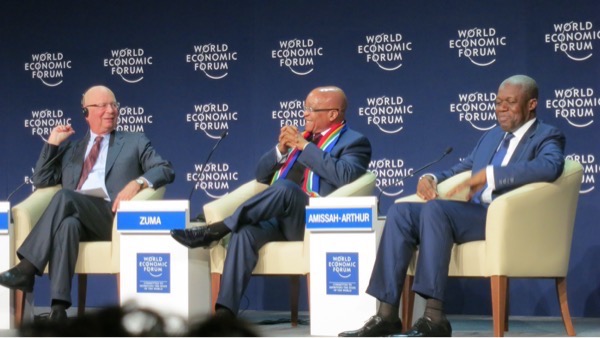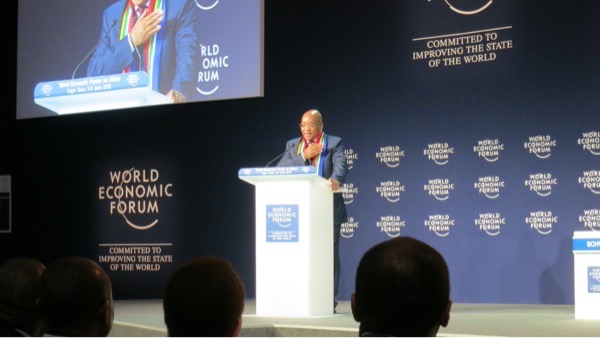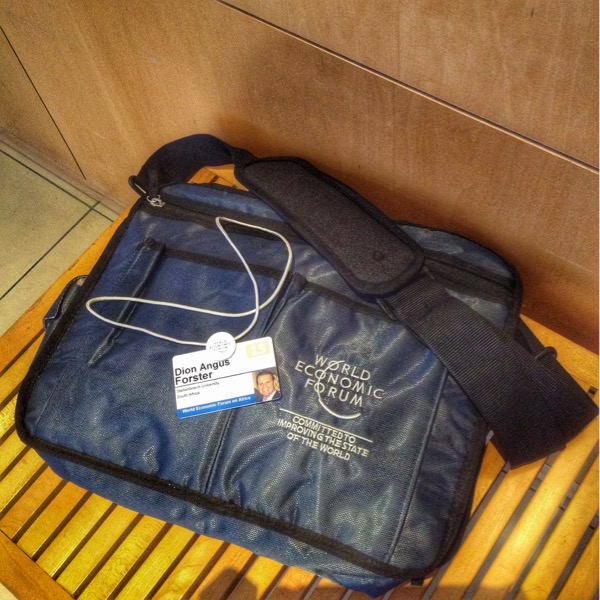World Economic Forum 2015 - day 3
 Friday, June 5, 2015 at 6:26PM
Friday, June 5, 2015 at 6:26PM 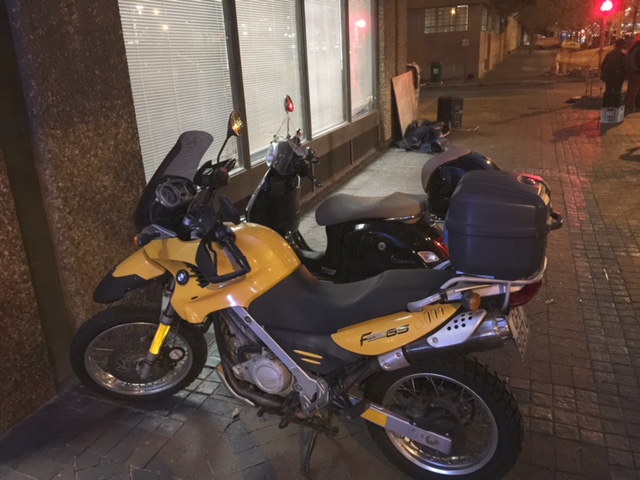 Today was the third and final day of the World Economic Forum that was held in Cape Town from 3-5 June 2015.
Today was the third and final day of the World Economic Forum that was held in Cape Town from 3-5 June 2015.
Once again I rode my trusty steed (a 2001 model BMW 650GS motorcycle) into the city for the meetings. It was surprisingly cold, although with clear blue skies as I drove into the beautiful Cape Town city bowl. I never grow tired of the beautiful view as one crests De Waal drive into the city.
Having parked just across the road from the CTICC (Cape Town Internation Convention Center) I made my way through security, now quite experienced at what beeps and what doesn't, and made my way upstairs for the first of my sessions.
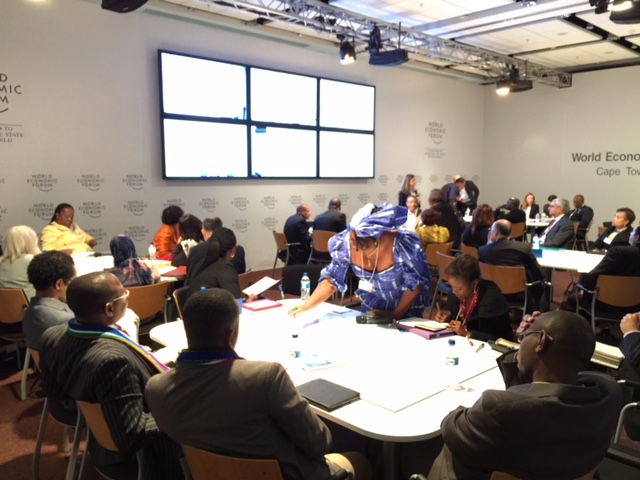 I started the day with a session on agriculture, development and food security. There were a few startling revelations in that session, notably that by 2050 the population of Africa will double, but our capacity to produce food will not. In large measure this is because of too few commercial farmers, poor policy in agriculture and political instability and war threatens food security. Water, of course, remains an additional challenge. It was shocking to learn that there are 85 million malnourished persons in Africa, and that a large number of those are subsistence farmers and their families. Again, the issue of gender inequality featured in this talk. Women produce +- 80% of the food in Africa but only own 2% of the land. Men tend to keep the best pockets of land for themselves and often don't utilize it fully. What was also interesting to be reminded of is that Africa is the world's most resource laden continent - in other words, we are the richest continent on the planet when it comes to natural resources, but because of extractive injustice (where our minieral resources are extracted and sold elsewhere in the world) we are so poor that we have to import food to support our populations. Lastly, we discovered that rural women tend to be better managers of farms, food and finance (better than urban women, and better than all men). So, what's the lesson? Well, I think that if we had targeted projects to support and uplift rural women we could achieve a great deal for the common good in Africa. Naturally we need to develop commercial farmers and technologies to drive efficient and healthy food production that is not destructive of the earth's resources and that can feed growing numbers of people.
I started the day with a session on agriculture, development and food security. There were a few startling revelations in that session, notably that by 2050 the population of Africa will double, but our capacity to produce food will not. In large measure this is because of too few commercial farmers, poor policy in agriculture and political instability and war threatens food security. Water, of course, remains an additional challenge. It was shocking to learn that there are 85 million malnourished persons in Africa, and that a large number of those are subsistence farmers and their families. Again, the issue of gender inequality featured in this talk. Women produce +- 80% of the food in Africa but only own 2% of the land. Men tend to keep the best pockets of land for themselves and often don't utilize it fully. What was also interesting to be reminded of is that Africa is the world's most resource laden continent - in other words, we are the richest continent on the planet when it comes to natural resources, but because of extractive injustice (where our minieral resources are extracted and sold elsewhere in the world) we are so poor that we have to import food to support our populations. Lastly, we discovered that rural women tend to be better managers of farms, food and finance (better than urban women, and better than all men). So, what's the lesson? Well, I think that if we had targeted projects to support and uplift rural women we could achieve a great deal for the common good in Africa. Naturally we need to develop commercial farmers and technologies to drive efficient and healthy food production that is not destructive of the earth's resources and that can feed growing numbers of people.
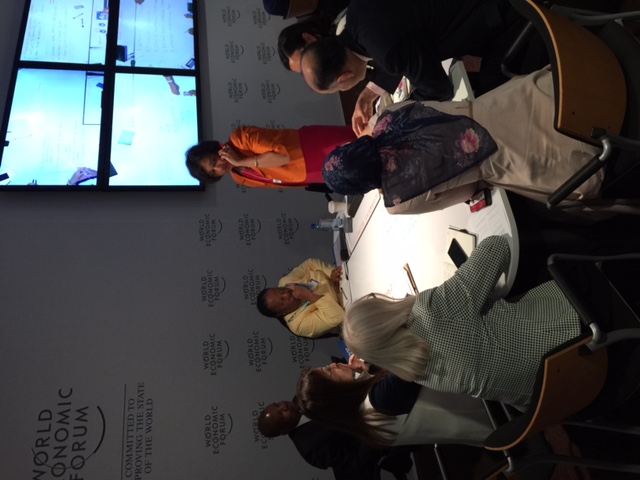 Next, I attended a workshop that sought to find solutions to drive development and growth in Africa in the next 10 years. I was fortunate to be seated at the table of Minister Naledi Pandor - what a remarkable woman! I was bowled over by her gentleness, her amazing grasp of policy, investment, technology and the complex set of social, political and economic aspects that are necessary for development and growth. How I wish she could be our President in South Africa! The process of this workshop was superb using new technology where we wrote on the tables and it showed up on screens in the front of the room. There were about 6 such tables participating around issues such as education, investment, technology, policy and governance etc.
Next, I attended a workshop that sought to find solutions to drive development and growth in Africa in the next 10 years. I was fortunate to be seated at the table of Minister Naledi Pandor - what a remarkable woman! I was bowled over by her gentleness, her amazing grasp of policy, investment, technology and the complex set of social, political and economic aspects that are necessary for development and growth. How I wish she could be our President in South Africa! The process of this workshop was superb using new technology where we wrote on the tables and it showed up on screens in the front of the room. There were about 6 such tables participating around issues such as education, investment, technology, policy and governance etc.
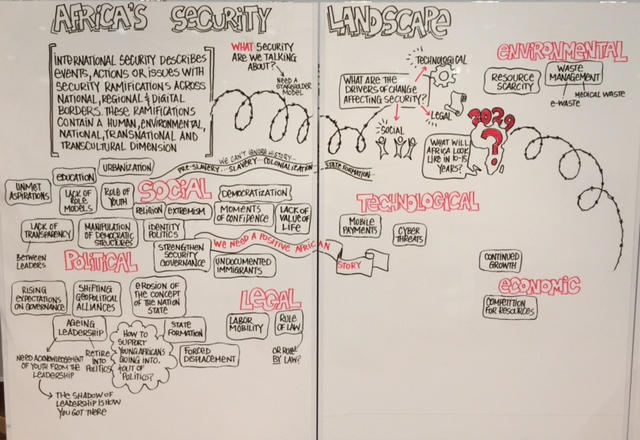
My second to last session of the day was another remarkable one - I participated in a workshop on security in Africa. The point of this grouping was to work out what some of the threats and opportunities were that Africa faced in terms of security in the next 10 years. I was in a group with Minister Mohamed Beni Yonis of Somaliland - a great peace keeper on the continent and a truly remarkable and wise man! His insights into social, economic and technology opportunities and challenges were astounding. He also appreciates the central role that religion plays in shaping societies in Africa (both negatively and positively). The meeting agreed that we shall need to spend a great deal more time and energy working with faith based organisations and the religious groupings in our various countries to address social cohesion, service delivery, poverty alleviation and also to work against violence and extremism. Then, the man whose name is signed on most of my South African money, Mr Tito Mboweni, was also in our group! He is such a kind (even fun!) person. He spoke about the dangers of ambition (he reached the pinnacle of his career as governor of the Reserve Bank before he was 50 years old). However, the group agreed that African society will need to acknowledge the place and importance of young leaders - one participant jokingly said that in Africa, presidency is something one 'retires into' at 65 after a working career! I am attaching an image of the drawing that contains all of our discussions and thoughts on security in Africa.
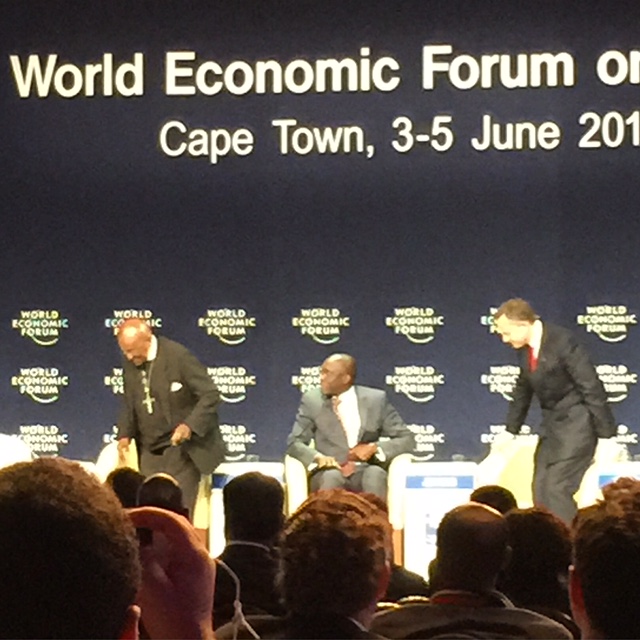 The final session was about economics, investment and trade on the continent. South Africa's finance Minister, Mr Nene, commented that "unless we deal with corruption all of our development plans will fail". The rest of the panelists discussed the challenges of competition and distrust between neighbouring and regionally close countries in Africa, the expensive cost of travel, and the need to see much greater trade cooperation and support among African countries.
The final session was about economics, investment and trade on the continent. South Africa's finance Minister, Mr Nene, commented that "unless we deal with corruption all of our development plans will fail". The rest of the panelists discussed the challenges of competition and distrust between neighbouring and regionally close countries in Africa, the expensive cost of travel, and the need to see much greater trade cooperation and support among African countries.
The highlight of the day, for me, was when Archbishop Tutu was invited onto the stage to close the WEF Africa meeting in prayer. He was overwhelmingly warmly received. He began his prayer, as I have heard him praying before, by saying that God is weeping at the way in which we treat one another and the earth. Yet, he went on in his jovial and loving way to say how happy God was to see the participants of the WEF and all those they represented who were people of good-will whose desire it was to make this world a better place for all by working for the common good. You can listen to his prayer (which I recorded on my phone) here.
Attending this form was a remarkable privilige. I have learnt so many things at the WEF this week. In particular I understand that we face a number of wicked problems that require partnership, cooperation, and even sacrifice to solve. Water and the environment, poverty and inequality, gender imbalances, massive growth in our population and dwindling resources are huge challenges. Yet, I am hopeful. It was amazing to meet creative, intelligent, passionate and committed people from all sectors of society who were working for good! The investment of time, energy, resources and self into these problems is sure to make a difference, and in many cases solve the problems we discussed.
I realise that South Africa is fast falling behind. Our political landscape and our own social context of poverty and inequality is vexing growth and cooperation. We shall need to do a great deal more to foster trust and a willingness to give up some things (like white power and wealth) and take up some things (like hard work, good education, and uncompromising moral standards). As I drove home I kept thinking that as Christians we must always ensure that our speech is peppered with hope, our hands are strengthened by justice and our hearts are filled with love as we work for a better future. We do need a much higher calibre of leadership from both government and the private sector. But what we need more than that is active citizens who are willing to be deeply involved in shaping a better world.


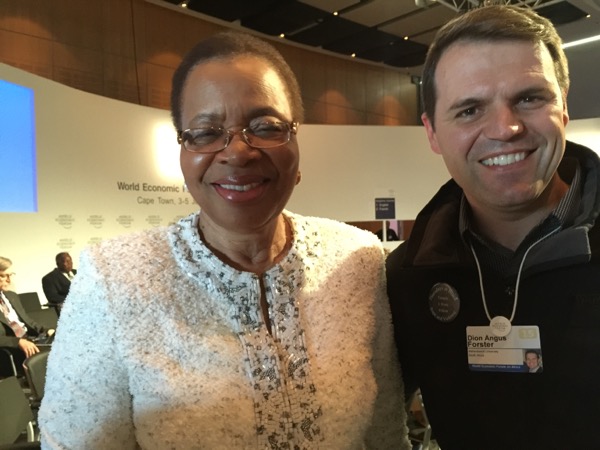
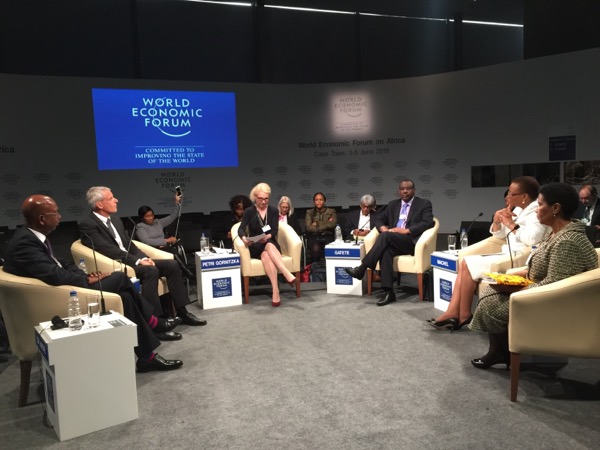
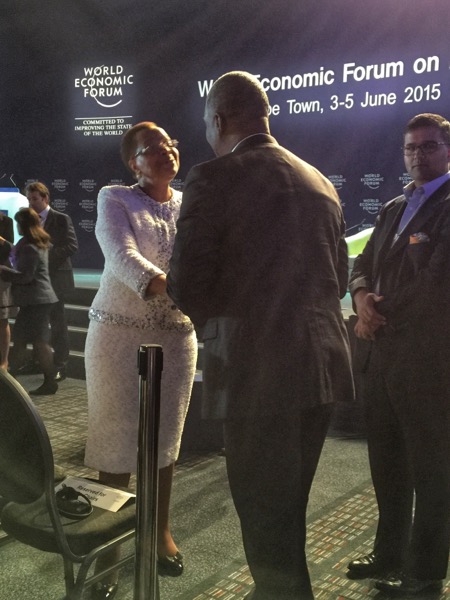
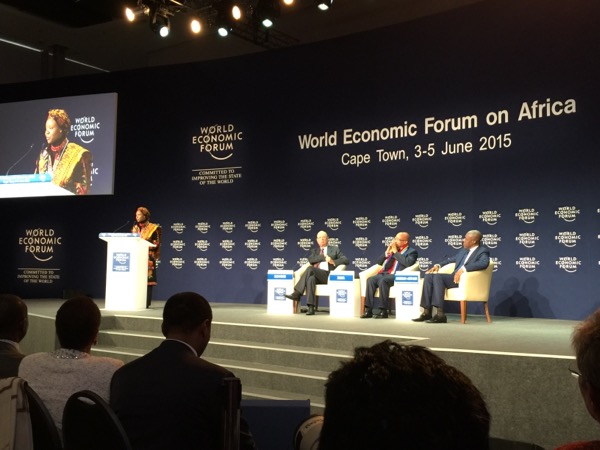 Today is the 2nd day of the World Economic Forum regional meeting in Cape Town, South Africa.
Today is the 2nd day of the World Economic Forum regional meeting in Cape Town, South Africa.